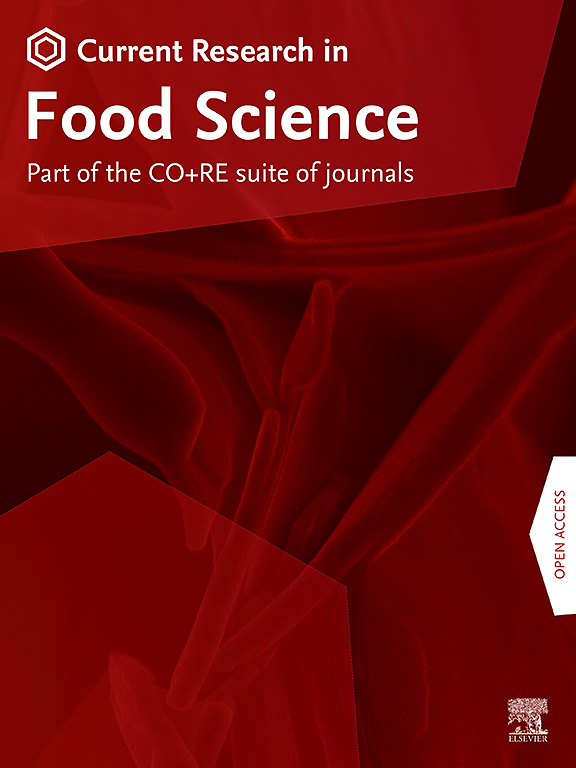2′-Fucosyllactose as a prebiotic modulates the probiotic responses of Bifidobacterium bifidum
IF 6.2
2区 农林科学
Q1 FOOD SCIENCE & TECHNOLOGY
引用次数: 0
Abstract
2′-Fucosyllactose (2′-FL), one of the most representative oligosaccharides in human milk, is intimately linked to the enrichment of specific Bifidobacterium species. However, the efficacy of 2′-FL in modulating the probiotic responses of bifidobacterium has been rarely researched. Thereinto, three key issues have yet to be reported: the effects of 2′-FL hydrolysis on bifidobacterial growth, the protective effects of 2′-FL on bifidobacterium under gastrointestinal stress and the inhibitory activity of 2′-FL metabolites against Cronobacter spp. This work intended to address these concerns. 2′-FL dramatically accelerated the growth and proliferation of Bifidobacterium bifidum YH17 and Bifidobacterium bifidum BBI01. The glucose in lactose core on 2′-FL was preferable for B. bifidum to achieve substantial increases in biomass while the galactose was not readily available. Additionally, 2′-FL showed unique advantages in ameliorating the resistance of B. bifidum to gastrointestinal challenges. 2′-FL considerably improved the adhesive property of B. bifidum, thus facilitating the competitive elimination of Cronobacter sakazakii ATCC 29544 and Cronobacter muytjensii ATCC 51329 by B. bifidum. The growth inhibition of 2′-FL on the Cronobacter strains was mediated by promoting the secretion of antibacterial substances from B. bifidum. The inhibitory activity hinged on the B. bifidum strains. 2′-FL specifically induced B. bifidum BBI01 to produce some antibacterial substances that were proteinaceous, thermostable and relatively stable even at pH 8.0. These antibacterial substances played a key role in the inhibitory activity and had a synergistic effect with acidification. These observations provide a useful guideline for developing synbiotic supplements to intervene the infant gut microbiota.

2′-聚焦乳糖作为益生元调控两歧双歧杆菌的益生菌应答
2 ' - focusyllactose (2 ' - fl)是人乳中最具代表性的低聚糖之一,与双歧杆菌的富集密切相关。然而,关于2′-FL调控双歧杆菌益生菌应答的研究却很少。其中,2 ' -FL水解对双歧杆菌生长的影响、2 ' -FL对胃肠道应激下双歧杆菌的保护作用以及2 ' -FL代谢物对克罗诺杆菌的抑制活性等三个关键问题尚未报道,本研究旨在解决这些问题。2′-FL显著促进两歧双歧杆菌YH17和BBI01的生长和增殖。2′-FL上乳糖核中的葡萄糖更有利于两歧双歧杆菌实现生物量的大幅增加,而半乳糖不易获得。此外,2 ' -FL在改善两歧双歧杆菌对胃肠道挑战的抵抗力方面显示出独特的优势。2′-FL显著提高了两歧双歧杆菌的粘附性能,从而促进了两歧双歧杆菌对阪阪克罗诺杆菌ATCC 29544和梅氏克罗诺杆菌ATCC 51329的竞争淘汰。2′-FL对克罗诺杆菌的生长抑制作用是通过促进双歧杆菌中抗菌物质的分泌来介导的。抑制活性取决于两歧双歧杆菌菌株。2′-FL特异性诱导双歧杆菌BBI01产生一些抗菌物质,这些抗菌物质具有蛋白性、耐热性,即使在pH 8.0下也相对稳定。这些抗菌物质在抑制活性中起关键作用,并与酸化有协同作用。这些观察结果为开发合成补充剂干预婴儿肠道微生物群提供了有用的指导。
本文章由计算机程序翻译,如有差异,请以英文原文为准。
求助全文
约1分钟内获得全文
求助全文
来源期刊

Current Research in Food Science
Agricultural and Biological Sciences-Food Science
CiteScore
7.40
自引率
3.20%
发文量
232
审稿时长
84 days
期刊介绍:
Current Research in Food Science is an international peer-reviewed journal dedicated to advancing the breadth of knowledge in the field of food science. It serves as a platform for publishing original research articles and short communications that encompass a wide array of topics, including food chemistry, physics, microbiology, nutrition, nutraceuticals, process and package engineering, materials science, food sustainability, and food security. By covering these diverse areas, the journal aims to provide a comprehensive source of the latest scientific findings and technological advancements that are shaping the future of the food industry. The journal's scope is designed to address the multidisciplinary nature of food science, reflecting its commitment to promoting innovation and ensuring the safety and quality of the food supply.
 求助内容:
求助内容: 应助结果提醒方式:
应助结果提醒方式:


